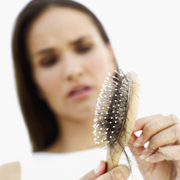Treatment
Treatment will depend on the cause of the condition. Treatments include:
Medications
To treat related conditions:
- Drugs to correct a hormonal imbalance or deficiency
- Changing medication that may be causing the hair loss
- Antifungal shampoos and pills—to treat fungal infections
Direct treatment for baldness:
-
For men—a prescription drug (
finasteride
)
- Note: Pregnant women should not even handle this medication. Even a small amount absorbed through the skin of the hands can cause birth defects in baby boys.
-
Over-the-counter medication (
minoxidil
)—applied to the scalp daily (must be used on a regular basis)
- Note: If you have heart problems, discuss this drug with the doctor before using it.
- Steroid injection into your scalp—to help speed-up hair re-growth in alopecia areata
Alternative Treatments
- Topical immunotherapy—apply an allergen to scalp that causes local reaction like redness, itching and also induces hair growth; done if other efforts do not work
- Phototherapy —potential treatment for patients with alopecia areata; usually done over 4 to 6 months
Lifestyle Changes
Be gentle with your hair. Avoid pulling it tightly. If pulled over a long period of time, scarring can occur resulting in permanent hair loss.
If treatment does not correct the hair loss, you may opt for a wig, hairpiece, or hair weaving.
If emotional stress is the cause, learn and practice stress-management techniques.
Surgery
This can involve:
- Hair transplant—taking hair from the back and sides of the head and transplanting it in bald areas. As many as 300 grafts may be needed. You must return multiple times for the grafts.
- Scalp reduction with flaps—cutting the scalp and pulling the areas with hair closer together.
Chemotherapy Induced
- It could be minimal, moderate or severe.
- It is transient and completely reversible after chemotherapy is done.
- Currently, there are no medications available that were shown to reduce the risk of alopecia associated with cancer treatments.
Please be aware that this information is provided to supplement the care provided by your physician. It is neither intended nor implied to be a substitute for professional medical advice. CALL YOUR HEALTHCARE PROVIDER IMMEDIATELY IF YOU THINK YOU MAY HAVE A MEDICAL EMERGENCY. Always seek the advice of your physician or other qualified health provider prior to starting any new treatment or with any questions you may have regarding a medical condition. Copyright © 2024 EBSCO Publishing All rights reserved.
 Does Hair Loss Mean That I Have a Thyroid Problem?
Does Hair Loss Mean That I Have a Thyroid Problem?








